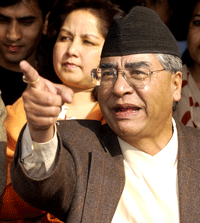
Your Majesty.
I believe I have the best plan to take the country back on tracks. I urge you to unilaterally announce the formation of an interim government with the following composition and at the same time restore all fundamental rights and release all political prisoners.
Prime Minister: Girija Koirala
Deputy Prime Minister: Hridayesh Tripathy
Deputy Prime Minister: Madhav Nepal
Deputy Prime Minister: Pushpa Kamal Dahal
Ministers: Sher Deuba, Pashupati Rana, Prakash Lohani, Badri Mandal, Amik Sherchan, Baburam Bhattarai, Uttar Ram Tamata, Shailaja Acharya.
This will be a take it or leave it proposition for all the names listed and they will have two weeks to decide except for the two Maoist names who will have two months. So if Girija Koirala were to decline to participate, Your Majesty will promote one of the DPM candidates. I would recommend the name of Hridayesh Tripathy. I have worked with him. He is one of the sharpest minds I ever met, and he is fun to be with. Plus, the country never had a Madhesi Prime Minister, a Madhesi DPM yes, thanks to you, but never a PM. Or Your Majesty could even skip the Koirala option altogether, out of respect for the great leader’s age, and go straight for the Tripathy option.
I would not worry about the Maoists refusing to participate and disrupting the referendum even if there were no non-Maoist counterbalance. There is plenty of that within, plus I do not wish to make too much of the recent surfaced differences between its two top leaders. Those two have more in common than otherwise, and I believe together they will make the right choice given a respectful exit like this one.
The cabinet will have a four point agenda:
- Provide extra personal security to the Maoist leaders.
- Add a half dozen members to reflect the gender, regional, ethnic and caste diversity of the country.
- Hold a referendum within six months to get this constitution accepted by the Nepali people.
- Within six months of the constitution getting accepted, hold elections to the Pratinidhi and the Rajya Sabhas.
A lot of work has gone into the constitution. Its simplicity and brevity are testimony to that, not evidence against. I think the document is near complete. But I am open to suggestions from all parties concerned with one condition: I am the only one who may make changes to the document. It is a copyright issue.
If you accept this proposal, I promise to organize an online think tank on the national economy. Between this constitution that will make Nepal the world’s very first democracy and the think tank, the country will see double digit economic growth rates, year in year out, for 30 years. That is the future I see. If you care about the plight of the Nepali people, as I have every reason to believe you do, this should delight you.
There is also the bigger picture to look at. China and India are both going to come under immense pressure to imitate this constitution. That will see the dawn of The Asian Century. Forget the Hindus, become the king of all Asians: there are three times as many of those! I hope you will see this offer for what it is: the opportunity of a lifetime. I believe I have made you an offer you can not refuse, to borrow a line from one of your favorite movies, but I do not mean that in a sinister way.
And say hello to Prince Paras, his wonderful Indian wife, and their children on my behalf, if you will please. My greetings to the rest of your family as well.
With great respect, warm regards, and much affection.
Paramendra Bhagat

